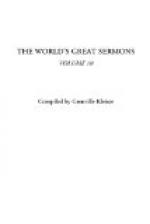effeminate contemplation, which had run to seed, in
favor of an active philanthropy which sought the enrichment
of the common life. But, my brethren, pulling
a plant up is not the only way of saving it from running
to seed. You can accomplish by a wise restriction
what is wastefully done by severe destruction.
I think we have lost immeasurably by the uprooting,
in so many lives, of this plant of heavenly contemplation.
We have built on the erroneous assumption that the
contemplation of future glory inevitably unfits us
for the service of man. It is an egregious and
destructive mistake. I do not think that Richard
Baxter’s labors were thinned or impoverished
by his contemplation of “The Saint’s Everlasting
Rest.” When I consider his mental output,
his abundant labors as father-confessor to a countless
host, his pains and persecutions and imprisonments,
I can not but think he received some of the powers
of his optimistic endurance from contemplations such
as he counsels in his incomparable book. “Run
familiarly through the streets of the heavenly Jerusalem;
visit the patriarchs and prophets, salute the apostles,
and admire the armies of martyrs; lead on the heart
from street to street, bring it into the palace of
the great king; lead it, as it were, from chamber to
chamber. Say to it, ’Here must I lodge,
here must I die, here must I praise, here must I love
and be loved. My tears will then be wiped away,
my groans be turned to another tune, my cottage of
clay be changed to this palace, my prison rags to
these splendid robes’; ’for the former
things are passed away.’” I can not think
that Samuel Rutherford impoverished his spirit or
deadened his affections, or diminished his labors
by mental pilgrimages such as he counsels to Lady
Cardoness: “Go up beforehand and see your
lodging. Look through all your Father’s
rooms in heaven. Men take a sight of the lands
ere they buy them. I know that Christ hath made
the bargain already; but be kind to the house ye are
going to, and see it often.” I can not
think that this would imperil the fruitful optimisms
of the Christian life. I often examine, with
peculiar interest, the hymn-book we use at Carr’s
Lane. It was compiled by Dr. Dale. Nowhere
else can I find the broad perspective of his theology
and his primary helpmeets in the devotional life as
I find them there. And is it altogether unsuggestive
that under the heading of “Heaven” is to
be found one of the largest sections of the book.
A greater space is given to “Heaven” than
is given to “Christian duty.” Is it
not significant of what a great man of affairs found
needful for the enkindling and sustenance of a courageous
hope? And among the hymns are many which have
helped to nourish the sunny endeavors of a countless
host.
There is a land
of pure delight
Where
saints immortal reign;
Infinite day excludes
the night,
And
pleasures banish pain.
What are these,
arrayed in white,
Brighter
than the noonday sun?
Foremost of the
suns of light,
Nearest
the eternal throne.




